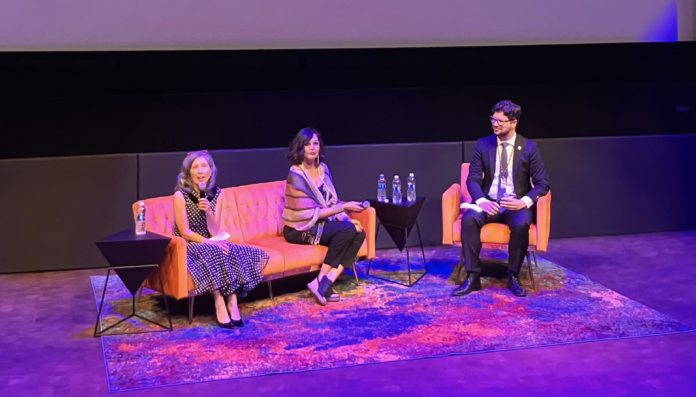
“Mount Rushmore represents white supremacy. It is the face of four white men, men who believed in slavery, men who kicked [the Indigenous people] off our land.” This quote was drawn from “Lakota Nation vs. the United States,” which has been set to play in select theaters across North America.
A screening of the documentary film “Lakota Nation vs. the United States” was held on Sept. 28 with Layli Long Soldier at The Beverly Theater, hosted by UNLV’s Black Mountain Institute and NuWu Art + Activism Studios. Jesse Short Bull and Laura Tomaselli directed the film, and Layli Long Soldier is an Oglala Lakota poet and activist who had excerpts of her poems, “38” and “135 X’s,” featured in the documentary.
Prior to the event, Fawn Douglas, an activist, former councilwoman and member of the Las Vegas Paiute tribe, read an excerpt of another work by Layli titled “Whereas” before introducing Layli Long Soldier. “Whereas” is Long Soldier’s debut poetry collection and is composed of two parts, with the second part containing one individual poem which bears the same title as the book and in which was written in response to the congressional resolution of apology of President Obama to Native Americans in 2009. This resolution of apology is also referred to as the S.J. Res. 14. Upon coming up to the stage, Layli shared that this was her first time being in Las Vegas and felt that “this [experience] is really fancy for [her].” She then proceeded to read her poem, “135 X’s,” which was about the 135 signatures of tribe leaders on a treaty that was never respected by the United States federal government. During the reading, she shared that she primarily dedicates this poem to the tribe leaders and that most of the leaders in the regions were known to have signed with “X’s.”
“Lakota Nation vs. the United States” was split into three parts, with each part being titled “Extermination,””Assimilation,” and “Reparation.” Different aspects pertaining to Indigenous history are touched upon in the film such as colonization, language, residential schools, executions, current activist movements, and violence enacted by the government that the Indigenous people endured. During the documentary, there was a moment in which Milo Yellowhair contemplated the beauty of the Black Hills Mountain, saying, “I live in the beauty of this creation.” Krystal Two Bulls then says, “The land itself is living. It represents life.” Nick Estes continued by expressing, “That’s why the Black Hills are not on sale. We are not on sale.” The film also included interviews and commentary from other various activists and leaders, including Nick Tilsen, Phyllis Young, and Candi Brings Plenty. At one point, Layli goes on in the documentary to narrate, “Although I feel lost on this trail, I know I’m not alone.”
At the end of the documentary, Long Soldier engaged in a conversation alongside BMI executive director Colette LaBouff and chief judge for the Las Vegas Paiute Tribal Court Kostan R. Lathouris, sharing her thoughts on how she got involved in the documentary and her thoughts on language use. When it comes to language, she believes to think of the matter in the perspectives of spiritual terms and laws. She also communicates that “It’s through our language how important it is that we can access who we are.” Layli was also asked questions regarding change to which she responded by saying to “remember that we’re a part of things” and that no matter what field or community we are, we are all here together doing our very best. She goes on to express that “To be common, to be regular, is something to be proud of. We are each going to contribute just a little bit of that change.”
After the talk following the film’s viewing, Layli also held a book signing for her book “Whereas,” in which she partook in signing books and having small chats with attendees. In a chat, Layli Long Soldier shares her definition of poetry, saying, “I don’t think it’s quantifiable. Poems don’t have to have words or language in it. When you see the grass moving with the wind and how it looks like a wave, I think that’s a poem. Sometimes poems are words and sometimes poems are how nature is.”
Among the crowd of attendees were UNLV students and faculty. Dr. Andrew Nicholson, an English professor at UNLV, shares his experience. Nicholson expresses, “Layli Long Soldier’s book ‘Whereas’ was one of the most remarkable books of poetry in recent years. It’s a book that speaks to the Lakota experience through a vibrant excavation of language. She’s a marvelous poet, and her presence brought my attention to the film. ‘Lakota Nation vs. the United States’ did an excellent job of narrating the criminal actions of the United States throughout the country’s history with the Lakota. It’s a history that is powerful upon first being heard.” A day prior to the film screening, Long Soldier also visited the UNLV campus and held a craft talk at the Beverly Rogers Literature and Law Building, giving poetry and writing advice.
Layli Long Soldier leaves the audience with a parting thought, saying, “If you live on this land, you are an inheritor of the treaty. You are responsible, non-native or not.”To learn more about Layli Long Soldier’s film, you can visit the official website at https://www.lakotanationvsus.movie/ or watch the official trailer at https://www.lakotanationvsus.movie/videos/. “Lakota Nation vs. United States” is available for streaming on both Apple TV and Amazon Prime Video.
